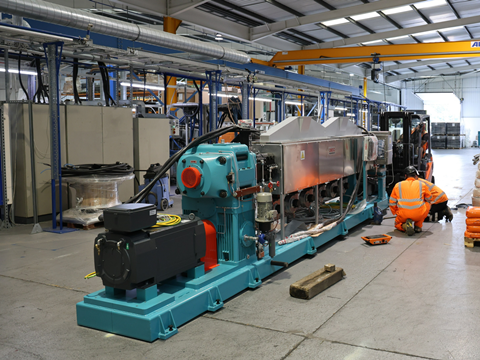
Twinplast, a manufacturer of corrugated polypropylene solutions, has invested £1.5m in a new extrusion line, aiming to enhance its ability to deliver bespoke packaging, storage and display products.
Manufactured in Milan by Omipa Extrusion Machinery, the new machinery is expected to increase the capacity of Twinplast’s extrusion line by 3-4 times, at an energy consumption rate of 40% less per tonne of material produced. The company has also invested in improvements to cooling equipment that it anticipates will save a further 5% of the energy used to run all machines in the factory.
The new facilities will also support Twinplast’s ability to customize solutions developed by an in-house technical design team. The company states the investment will cement its position as the manufacturer with ‘the most comprehensive choice of corrugated polypropylene products’ in the marketplace.
Toby Garrett, managing director at Twinplast, said: “This investment marks a major stage in Twinplast’s growth strategy, enabling us to deliver bulk orders faster and more energy efficiently. As well as being a game changer for our production capacity, with output of up to 1500kg/h, it will enable significant carbon reduction – we estimate that energy saved in a year will be in the region of 62 tonnes of CO2 when converted from kWh. The new line will manufacture products that are durable, returnable, reusable and recyclable, helping to reduce unnecessary waste and costs.”
Tim Steer, commercial director at Twinplast, added: “The new extrusion line offers exceptional versatility. That’s a vital function for our business – being able to manufacture infinite shapes and produce thousands of bespoke solutions for all manner of applications has enabled us to work with leading UK businesses and organizations across a wide range of sectors including FMCG, retail, horticultural, construction, industrial, healthcare, packaging, logistics and pharmaceutical.”
Earlier this year, Reifenhäuser Extrusion Systems debuted its new Coextrusion Adapter Flex for cast, sheet, and coating extrusion, designed as a cost-effective yet highly flexible system for film profiling, at NPE 2024. The Flex variant is apparently set to achieve the ideal layer thickness and unlock highly flexible production at low investment costs.
Last month saw Aluminium Deutschland warn that all sub-sectors of the German aluminium industry experienced declines in production in Q1 2024, with energy costs remaining high and recycled aluminium thought to have decreased by 7%, while third-country imports have impacted the extrusion sector. In the aluminium extrusion sector, German manufacturers state that third countries, especially Turkey, are applying competitive pressure.
If you liked this story, you might also enjoy:
How are the top brands progressing on packaging sustainability?
Sustainable Innovation Report 2024: Current trends and future priorities
Reuse vs. single use – which is better for the environment?
The ultimate guide to global plastic sustainability regulation














No comments yet